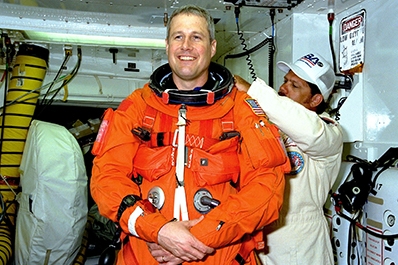HANOVER, N.H. – April 2, 2020 – A series of self-help tools designed to help astronauts cope with confinement in small spaces for extended periods of time is accessible to the general public as part of an ongoing research study.
The research series—the Dartmouth PATH Program—was developed to determine how the space program can manage pressures brought on by long-duration spaceflight. The PATH program is already being tested in extreme environments such as research stations in Antarctica.
These are the types of tools that might help people combat the emotional stresses brought on by COVID-19.
Image  |
| Dr. Jay Buckey, director of Geisel’s Space Medicine Innovations Lab, flew aboard the space shuttle Columbia in 1998. (Credit: NASA) |
“These resources are meant to make anyone better at stress management, depression treatment and conflict resolution,” said Dr. Jay Buckey, a professor of medicine at Dartmouth’s Geisel School of Medicine. “These are self-help tools. The individual is doing the work. The tools offer practical things that people can do in any environment.”
Buckey, a former astronaut and currently the director of Geisel’s Space Medicine Innovations Lab, flew aboard the space shuttle Columbia in 1998. Buckey and his research colleagues at Dartmouth, Harvard, and UCLA developed the tools over more than a decade.
“People who are isolated and confined are at risk for conflict, stress and depression,” said Buckey. “Fortunately, there are skills people can use to deal with this, and these can be learned.”
According to Buckey, the psychological challenges of orbiting Earth in a spacecraft for long periods can be similar to being stuck at home with a small group of family members or roommates.
“Outer space and your own living room might be drastically different physically, but emotionally the stressors can be the same,” said Buckey. “There is no reason why people who suddenly find themselves stuck at home for long periods of time—alone or with others—shouldn’t find this research to be helpful.”
The online tools—including video sessions and information sheets—are hosted by Dartmouth as part of the Geisel research program, and they can be accessed on any laptop or desktop computer after registration. Visitors to the site do not have to be affiliated with Dartmouth College.
Dartmouth PATH Program Highlights for Stress, Depression, and Conflict
- For Stress: Strategies for assessing a stressful situation correctly, to avoid over-reacting, “catastrophizing,” or making judgements that don’t fit the evidence. Also includes relaxation techniques, tools to help put aside troubling thoughts, and advice on effective communication.
- For Depression: A structured, practical problem-solving approach, which previous studies have shown can improve mood.
- For Conflict: Examples and exercises that explain how each individual’s differing interpretations of statements, and the meanings assigned to those statements, can escalate conflict. Also, interest-based negotiation tools designed to help people get to good solutions while maintaining relationships.
- For Complete Isolation from Nature: Buckey’s lab has developed virtual reality tools that create an immersive natural environment. Since acquiring VR headsets is not possible for most people, Buckey says that viewing photos or videos of nature from a television, computer, photo album, or picture book may give close to the same effect.
Mobile devices like phones and tablets are not currently supported. Since the programs are offered as part of a research project, users will need to sign a consent form to access them.
“Our experience has shown that it’s best for people to take their time when trying to change how they think about a situation or when developing a new behavioral skill,” said Buckey.
For more information and to access the program, visit: path.dartmouth.edu

